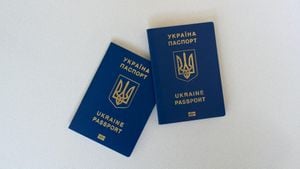Vidhu Vinod Chopra, the eminent Indian filmmaker known for his influential works like 3 Idiots and Munna Bhai MBBS, took the spotlight recently at the International Film Festival of India (IFFI) held at the picturesque Kala Academy, Goa. Amidst the vibrant atmosphere filled with enthusiastic film students and festival-goers, the director opened up about his illustrious yet tumultuous filmmaking career, reflecting on the significant moments—both high and low—that shaped his path.
During his engaging masterclass, Chopra brought to life his experiences and challenges, humorously dubbing these experiences as his 'zero moments.' These were the times when self-doubt crept in, moments he needed to confront to continue his creative ventures. The conversation, mostly lighthearted and studded with musical elements, saw Chopra explore his past with musician and friend Shantanu Moitra, who prompted him to share his earnest experiences throughout his cinematic endeavors.
One of the most poignant narratives he recounted was his struggle to share his ambition of becoming a filmmaker with his father, who envisioned him as a doctor. "The only dream I had was to assist Vijay [Goldie] Anand," Chopra shared, highlighting his early days filled with uncertainty and aspirations. Despite earning an Oscar nomination for his 1978 documentary short An Encounter With Faces, Chopra encountered setbacks, including waiting for what felt like eons for his mentor to acknowledge his potential.
Chopra narrated the story of his 1986 film Khamosh, which he described as full of potential yet met with lukewarm acceptance. "Everybody loved the film, but nobody bought it," he lamented, reflecting on the hurdles he had to jump through to keep the production flowing. This included repaying INR 8 lakh (approximately $75,000) to the National Film Development Council, which had financial stakes on the film. Despite the challenges, Chopra’s innovative marketing strategies saw him take unconventional routes to promote his films, including buying up every ticket for one of his screenings just to proclaim it was sold out, showcasing his resourcefulness and passion for cinema.
Chopra's career took off with projects like Parinda, which is credited for introducing realism to Indian cinema. Despite facing skepticism over casting Jackie Shroff—a decision critics warned him against because of the actor's prior performances—Chopra displayed unwavering faith in his vision. Another significant scene, featuring the violent demise of characters played by Madhuri Dixit and Anil Kapoor on their wedding night, was met with apprehension. “I was trying to say violence begets violence,” Chopra elaborated on his intent. His bold decisions during the film's production not only blossomed Parinda's success but also paved the way for international opportunities, as he later directed the Hollywood remake titled Broken Horses.
Despite his towering successes, Chopra admitted to facing difficulties with interpersonal relationships within the industry. He reflected on his strained rapport with actors, mentioning notable disagreements with Naseeruddin Shah, which made for some contentious moments during production. "I don’t trust directors. I only trust specific human beings,” he stated bluntly, pointing to the underlying challenges of collaboration inherent within the film industry.
Throughout the masterclass, Chopra emphasized the importance of self-belief. "I don’t see much difference between directing and producing; I only make the films I believe in," he said. Moments later, he shared his thoughts on awards, summarily discarding their importance, as he stated, "Awards are from people outside you. They are not important. The real question is, ‘Did I make a good film?’” This notion encapsulated his approach to filmmaking and the creative process.
Moitra, who shared the stage, added levity to Chopra’s serious reflections, playfully labeling him as “the toughest man to work with” before the audience of eager fans. Even as they joked about his leadership style, Chopra's integrity and focus on his vision remained ever-present. Throughout the conversation, his passion for storytelling and commitment to creativity shone brightly, reaffirming his role as one of India’s cinematic legends.
Chopra’s mantra for filmmaking—what he calls the “three Es”—is simple yet powerful: entertain, educate, and elevated. He recalled the words of Swedish filmmaker Ingmar Bergman, emphasizing the filmmaker’s duty to engage audiences without compromising their artistic integrity. His mantra encapsulates his philosophy of leaving audiences with lasting reflections through meaningful storytelling.
"The three Es of Vidhu Vinod Chopra Films are: to entertain, to educate if you can, and to elevated. That’s the way I want to live my life," he stated during the event, laying bare the deep-set principles guiding his cinematic pursuits.
With famous projects spanning multiple decades, Chopra’s impact on Indian cinema, from starting with more understated projects to creating box-office giants, is undeniable. His willingness to challenge norms—to create films with grounded realities and poignant narratives—has placed him among the most revered directors of his time. The film industry itself continues to evolve, yet Chopra’s stories resonate with both aspiring filmmakers and seasoned filmmakers alike, serving as reminders of what it means to adhere to one’s vision. His blend of personal challenges and triumphs not only uplifts his narrative but also serves as guidance for future generations of filmmakers.
Vidhu Vinod Chopra remains not only a filmmaker but also a storyteller at heart, shaping the way stories are told and received by audiences across cultures. His open, reflective approach to discussing his career, peppered with humor and musical interludes, showcased the essence of cinema as more than just entertainment—it's about connection, personal truths, and the timeless quest for meaning within the frames.



